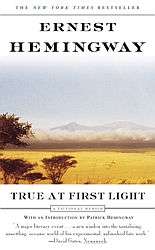True at First Light

Editorial Scribner
Fecha de edición julio 2000
Idioma inglés
EAN 9780684865720
320 páginas
Libro
encuadernado en tapa blanda
Resumen del libro
Both revealing self-portrait and dramatic fictional chronicle of his final African safari, Ernest Hemingway's last unpublished work was written when he returned from Kenya in 1953. Edited by his son Patrick, who accompanied his father on the safari, True at First Light offers rare insights into the legendary American writer.
The book opens on the day his close friend Pop, a celebrated hunter, leaves Ernest in charge of the safari camp and news arrives of a potential attack from a hostile tribe. Drama continues to build as his wife, Mary, pursues the great black-maned lion that has become her obsession and Ernest becomes involved with a young African girl whom he supposedly plans to take as a second bride. Increasingly enchanted by the local African community, he struggles between the attraction of these two women and the wildly different cultures they represent. Spicing his depictions of human longings with sharp humor, Hemingway captures the excitement of big-game hunting and the unparallel beauty of the landscape. Rich in laughter, beauty and profound insight. True at First Light is an extraordinary publishing event -- a breathtaking final work from one of our most beloved and important writers.
Biografía del autor
x{0026}lt;P x{0026}lt;B Ernest Hemingwayx{0026}lt;/B (Oak Park, Illinois, 1899) forma parte ya de la mitología de este siglo, gracias no solo a su obra literaria, sino también a la leyenda que se formó en torno a su azarosa vida y a su trágica muerte. Hombre aventurero y amante del riesgo, a los diecinueve años, durante la Primera Guerra Mundial, se enroló en la Cruz Roja. Participó asimismo en la Guerra Civil española y en otros conflictos bélicos en calidad de corresponsal. Estas experiencias, así como sus viajes por África, se reflejan en varias de sus obras. En la década de 1920 se instaló en París, donde conoció los ambientes literarios de vanguardia. Más tarde vivió en lugares retirados de Cuba y Estados Unidos, donde, además de escribir, pudo dedicarse a una de sus grandes aficiones: la pesca, un tema recurrente en su producción literaria. En 1954 obtuvo el Premio Nobel de Literatura. Siete años después, sumido en unaprofunda depresión, se quitó la vida. Lumen ha publicado sus novelas x{0026}lt;I Adiós a las armasx{0026}lt;/I ;x{0026}lt;I Por quién doblan las campanasx{0026}lt;/I ; x{0026}lt;I Verdes colinas de Áfricax{0026}lt;/I ; x{0026}lt;I El viejo y el marx{0026}lt;/I , por lax{0026}lt;/P x{0026}lt;P que recibió el Premio Pulitzer en 1953; el libro de memorias x{0026}lt;I París era una fiestax{0026}lt;/I ; sus x{0026}lt;I Cuentosx{0026}lt;/I , recopilados por el propio autor, y su primer libro de relatos, x{0026}lt;I En nuestro tiempox{0026}lt;/I .x{0026}lt;/P







